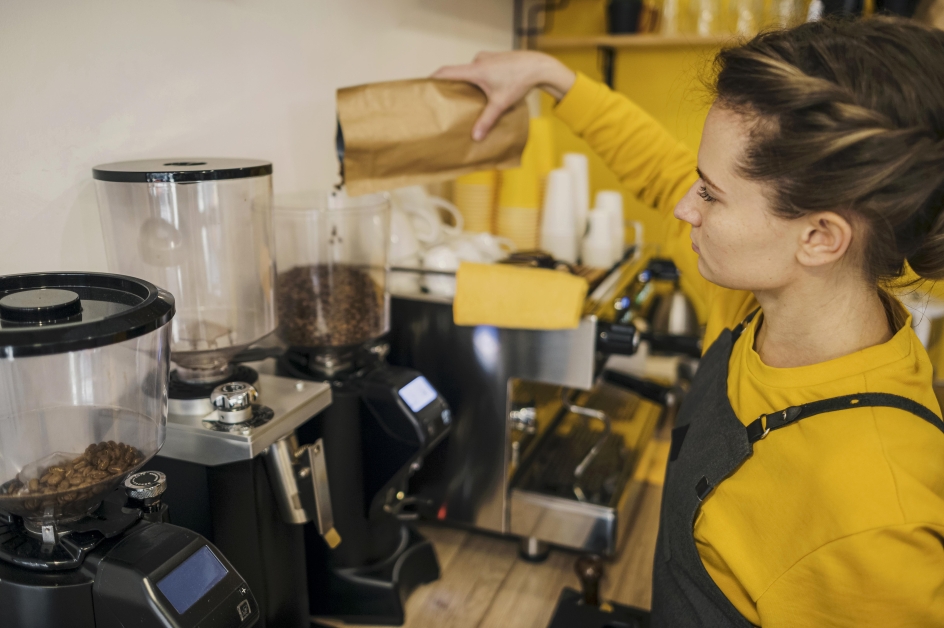
local non-chain coffee shop
Coffee lovers have strong opinions on where to find the best brew. Local (independent) coffee makers often highlight unique beans. They offer creative blends. Chain brands promise consistency. They provide familiar flavors no matter where you are. Each style has its loyal fans and its hidden pros and cons.

In a side-by-side taste test, the results might surprise even the most devoted caffeine fans. Local spots bring fresh ideas and bold flavors. Chains often deliver smooth, reliable coffee. This is thanks to high bean turnover and standardized equipment. Keep reading to see what sets each cup apart and which might actually taste better in your mug.
What Distinguishes Local and Chain Coffee Makers?
Local and chain coffee makers do things differently from the ground up, and these differences show up in every cup. They are set apart by the beans they choose, their brewing techniques, and the kind of service you experience. Understanding these core distinctions can make your next coffee stop even more satisfying.
Bean Sourcing and Quality
Local coffee shops tend to be passionate about bean quality. Owners often take time to handpick beans from trusted, sometimes direct, sources. You’ll often see terms like single-origin, micro-lot, or direct-trade featured on their menus. This means:
- Beans are freshly roasted, usually in small batches.
- They’re often traceable to a specific farm, co-op, or region.
- Many independent cafés focus on ethical sourcing, paying above market rates to support sustainable practices.
These choices don’t just tick boxes for ethics, they deliver real flavor. Fresh, high-quality beans offer vibrant, complex notes. You can actually taste these notes. Think blueberry in a lighter Ethiopian roast or deep chocolate in a Guatemalan cup.
Chain coffee makers, on the other hand, need the ability to brew the same coffee in every store, every day. Their priorities:
- Consistency and volume—massive quantities bought through global suppliers.
- Strict quality checks for defects, but a focus on uniform “house” profiles.
- Sourcing standards do exist. Companies like Starbucks invest in ethical programs. However, the supply chain is sized for millions of cups a day.
For the average coffee fan, this ensures predictability, but sometimes at the expense of freshness and distinctive flavors. The beans are often roasted darker to balance out regional differences and keep the taste steady across locations.
Equipment and Brewing Techniques
Walk into a local café and you might notice an array of brew methods—a gleaming espresso machine, maybe pour-over devices, siphon brewers, or even classic French press. These shops often invest in professional-grade or specialty equipment, allowing baristas to tailor brewing variables to each bean:
- Temperature and grind adjustment is handled meticulously.
- Techniques like pour-over, Chemex, or Aeropress highlight subtle flavors.
- Baristas may experiment and fine-tune, aiming to bring out the best in each batch.
This approach treats coffee more like a craft, letting both equipment and skilled hands shape every cup. It’s like the difference between a chef seasoning each dish or a fast-food line.
Chains rely on standardized machines to ensure a smooth, consistent cup no matter who’s behind the counter. You’ll usually see:
- Automated
Taste Test Results: local non-chain coffee shop
After reviewing recent blind taste tests, expert panels, and thousands of user ratings, clear patterns emerge in how local and chain coffee stack up in the cup. Local cafés, with their focus on freshness and bean quality, often produce exciting flavors and stand-out aromas that surprise even seasoned coffee fans. Do chain coffee giants catch up by nailing consistency and ease of access, or do they come up short on actual flavor? Here’s how the two compare, sip for sip.
Flavor Complexity and Freshness
When expert panels and consumer groups tasted coffee side by side, local cafés consistently outperformed in flavor depth and freshness. Most shops showcased beans roasted just days before brewing, often from single origins or small farms.
- Representative Tasting Notes from Local Cafés:
- Juicy, fruit-forward flavors like red currant, **pineapple taff
Expert Insights: What Really Impacts local non-chain coffee shop
Every memorable cup of coffee is shaped by a mix of human touch and technical details. Barista expertise, top-notch equipment, and precise methods can draw out delicate flavors or, if done poorly, mute even the finest beans. Coffee professionals agree that both skilled hands and carefully managed conditions make all the difference when comparing local cafés to big chains.
Barista Skill and Attention to Detail: Explore how staff expertise at local cafes leads to notable differences in taste and presentation.
Experienced baristas are like orchestra conductors for your cup, blending science and art with each drink. In local coffee shops, you’ll often find staff who are genuinely passionate about the craft—some are even nationally certified or have trained for years. This knowledge translates directly into what lands in your cup.
Key ways barista skill shapes flavor and presentation:
- Dialing in Espresso: Skilled baristas tweak grind size, weight, tamp pressure, and shot timing throughout the day. The result is balanced espresso with rich crema and smooth mouthfeel, instead of a bitter or sour shot.
- Milk Texturing: At specialty cafés, milk for lattes and cappuccinos is steamed with precise temperature and aeration, producing microfoam that’s silky, sweet, and integrates with the espresso. Attention here creates latte art and a naturally sweet flavor—not just warm milk floating on coffee.
- Savoring the Details: Local baristas often taste test their brews, discard off-flavor batches, and adjust recipes to highlight a bean’s unique notes, whether it’s a floral Ethiopian or a chocolatey Colombian.
- Personalization: Local spots can tailor drinks to match your taste—from changing the brew strength to suggesting beans that fit your flavor preferences.
Chains, by contrast, often need to stick to standard recipes and machine settings so every coffee will taste the same, whether you’re in Chicago or Singapore. The consistency is there, but it usually comes at the cost of personalization and flavor clarity.
Technical Factors: Equipment, Water, and Method: Summarize how technical excellence in specialty shops leads to flavor clarity, using concrete examples.
Expert-level equipment and careful technique bring out the purest flavors in coffee that generic machines just can’t replicate. Here’s what gives local cafés their edge:
- High-End Machines: Local shops often invest in commercial espresso machines with precise temperature and pressure controls (think La Marzocco or Synesso brands). These machines let baristas tease out flavors at the sweet spot, brewing at steady 198–202°F, which prevents bitterness or under-extracted sourness.
- Grinders Matter: Burr grinders, which create an even grind size, are standard in well-run cafés. Consistent grinds mean balanced extraction—with blade grinders, common in home and cheaper chain setups, it’s easy to get bitter, uneven flavors.
- Water Quality: Over 98% of coffee is water, and experts say water composition can make or break the taste. Specialty cafés filter their water to remove chlorine and heavy metals, and sometimes adjust mineral content to intensify natural flavors. Poor-quality water can make coffee taste flat or harsh, even with great beans.
- Brewing Methods: Local spots often offer manual brewing options (pour-over, Chemex, siphon) where every variable—time, temperature, coffee-to-water ratio—is fine-tuned to match the bean’s profile. For example, a Kenyan single-origin might be brewed with a slightly cooler pour-over for extra berry notes, while a Guatemalan gets a French press treatment to amplify its chocolatey finish.
- Routine Maintenance: Professional machines get daily cleaning to avoid the buildup of coffee oils, which can add rancid notes to drinks over time. This care is less strict in high-volume chain locations.
Studies and industry experts point out that roasting levels, bean processing, and brewing temp all interact with water and equipment to produce the final taste. In short, a recipe handled with precision and care unlocks the coffee’s potential. Without it, even the highest-quality beans can end up with muddled or uninspiring flavors.
When you’re sipping at your local café, you’re experiencing not just a different bean but the combined work of a skilled barista, thoughtfully chosen equipment, carefully filtered water, and a method honed by real coffee lovers. That’s what gives local coffee its standout taste—one that’s tough to match with even the priciest home gadgets or chain café automation.
Beyond the Cup: Social and Ethical Factors
Coffee is more than a morning fix or an afternoon treat. Where you buy your coffee shapes the stories, connections, and even the conscience of your community. The footprint of every dollar reaches far past the cafe’s counter, touching local neighborhoods, global farms, and the environment. This section spotlights the social and ethical factors that make supporting local or chain coffee makers a meaningful (and sometimes complicated) choice for many coffee fans.
Community and Local Economy Impact: local non-chain coffee shop
Local coffee shops do something chains simply can’t: they give neighborhoods a sense of belonging and vibrancy. Step inside most independent cafés and you’ll notice regulars chatting with staff, personal touches like community boards, and cozy setups ideal for everything from game nights to poetry readings. These cafes act as true neighborhood anchors, nurturing a friendly space that supports connection, conversation, and creativity.
Why your coffee dollar matters locally:
- Keeps money circulating in the community. When you support a local shop, your money often goes to local staff, nearby suppliers, and even other small food makers.
- Creates real jobs and futures. Small shops create jobs for locals who often stick around longer and care about building relationships with patrons.
- Spotlights community talent. Many indie cafes host art shows, musicians, and pop-up markets, turning their space into a launchpad for local talent and small businesses.
- Drives neighborhood renewal. Local coffee shops often set up in underused spaces, helping turn empty storefronts into lively community hubs.
These benefits don’t show up on a receipt but play out in stronger, more connected neighborhoods. Chains might offer speed and predictability, but few can match the character or sense of place that comes from a shop rooted in the local scene.
Ethics and Sustainability
Coffee drinkers today care about more than just flavor—they want to know their cup isn’t brewed at someone else’s expense. The push for ethically sourced beans and earth-friendly practices is driving real change in the industry. There’s still a long road ahead.
What matters in ethical coffee:
- Fair pay for farmers. True ethical sourcing means paying farmers enough to cover their costs and live with dignity. Only a small percentage of coffee farmers worldwide earn this, due to unstable prices and big-company bargaining power.
- Safe and fair working conditions. Child labor, gender inequality, and unsafe conditions are still real concerns at some farms. Certifications like Fairtrade and Rainforest Alliance set higher standards, but not all coffee meets them.
- Eco-friendly farming. Sustainable coffee comes from methods that protect water, soil, and forests—like shade growing, organic inputs, and biodiversity-friendly practices.
- Reducing carbon and waste. Local shops often lead by example, using compostable cups, sourcing locally to cut transport, and supporting small-batch, low-waste roasting.
Industry leaders and laggards:
- Some major chains, like Starbucks, promote ethical sourcing via programs such as C.A.F.E. Practices, which track economic, social, and environmental benchmarks. While these efforts are a step forward, critics argue that true traceability and direct relationships with farmers—practices embraced by many specialty local shops—deliver stronger results.
- Many local cafes go above and beyond, buying directly from small farms, paying better prices, and seeking out third-party verified beans. They’re also faster to adopt changes that lower their carbon footprint or support single-origin diversity, thanks to smaller supply chains and closer relationships.
Yet, not every local shop is a hero, and not every chain is a villain. Some small businesses cut costs on cheap beans while some global brands invest heavily in sustainability. It pays to ask questions and look for transparency—good coffee shops are usually proud to share their sourcing story.
In today’s market, ethics and sustainability aren’t just buzzwords—they’re essential values for many coffee lovers choosing where to spend. Supporting businesses that act responsibly can fuel a ripple effect that benefits farmers, the planet, and your own neighborhood, one cup at a time.
Conclusion on local and non-chain coffee shop
The taste test proves local cafés often surprise with lively flavors and true freshness, driven by skilled baristas and closer ties to their beans. Chains bring predictable coffee and quick service, which many rely on for busy routines, but they rarely match the depth or care local spots deliver. Consumer loyalty runs deeper than habit—it’s shaped by community feel, ethics, and even the story behind each cup.
Where you get your coffee reflects your priorities, not just your palate. Choose a local shop to support neighbors and enjoy unique brews, or stick with chains for steady, no-fuss options. Both choices matter and can shape the world one cup at a time. Thanks for joining the taste journey—share where you find your best coffee, and keep exploring new cups that surprise you.


